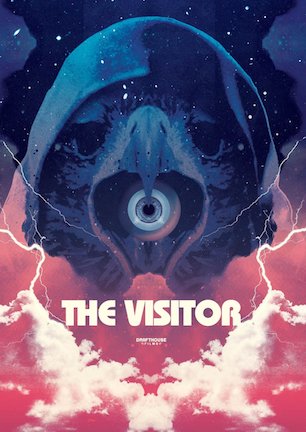Studio: Drafthouse Films
Director: Michael J. Paradise
Writer: Lou Comici, Robert Mundy, Michael J. Paradise, Ovidio Assonitis
Producer: Ovidio Assonitis
Stars: Mel Ferrer, Glenn Ford, Lance Henriksen, John Huston, Joanne Nail, Sam Peckinpah, Shelley Winters, Paige Conner
Review Score:
Summary:
An age-old battle between intergalactic good and evil is waged on Earth over a young girl with startling psychic abilities.
Review:
Remember Martin Landau on “Entourage?” What if I were to tell you that legendary Hollywood icons John Huston and Sam Peckinpah made a movie together, as actors, starring Lance Henriksen that featured a backboard exploding during an NBA game, a little girl using psychic powers to crush a hot dog stand, and Jesus Christ as an interplanetary kindergarten teacher? Is that something you might be interested in?
Two outcomes are most common when a movie continually inspires an “I can’t believe someone actually made this” reaction. One is insulted annoyance that a filmmaker would pull money from a viewer’s pocket using some contemptible drivel s/he knows is just chaotic claptrap carelessly tossed together. The other is hypnotic admiration for a mess so mired in nonsensical indulgences that it is gloriously oblivious to its indescribable status as something simultaneously awful and amazing. That latter reaction is exactly how cult classics are born.
Originally released in 1979, there is no faulting the critics of that era for unanimously panning “The Visitor” as a confusing clutter of disjointed scripting and jumbled staging. Those are justified accusations. It is the type of production only possible when developed from a script written by two different men from a story conceived by two more different men, with English as a second language for at least two of those four.
“The Visitor” is an amalgamated potpourri of “Close Encounters of the Third Kind” and “The Omen” mixed with a pinch of original “Battlestar Galactica” production value and direction influenced by the artsy aesthetic of Federico Fellini. That European flavor lends a bohemian style that frankly has little place in a sci-fi horror adventure film, or whatever “The Visitor” is.
John Huston is a galactic good guy on an earthbound mission to rewire the bloodline of a notorious space criminal who procreated with human women and passed on his corrupted psychic powers. Looking like an Exorcist-era Linda Blair dressed as P.J. Soles from “Halloween,” Paige Conner plays the not-so-innocent little girl with a seaworthy sailor’s mouth whose psychic prowess turns from mischievous to murderous when her mother refuses to birth a baby brother just like her. Disguised as the millionaire owner of a professional basketball franchise, Lance Henriksen is part of a cosmic cabal secretly devoted to making that baby brother a reality. Huston visits Earth to stop the diabolical plot and war breaks out between both factions over the junior Carrie White in the middle.
If the above summary reads as mildly perplexing, know that even this description makes the basic idea sound more straightforward than it really is. Probably only a fraction of “The Visitor” was ever meant to be comprehended linearly. The rest is a schizophrenic blend of imagery and symbolism that likely made sense to the moviemakers at the time of production, but no one else afterwards. It is a film so bizarre in concept and construction that you cannot help but wonder what it was that attracted top talent like Glenn Ford, Shelley Winters, and the aforementioned Peckinpah, Huston, and Henriksen.
Without reservation, “The Visitor” earns a downward point from a 1979 thumb for pointless side scenes, loony editing, and conceptualized self-importance that is in no way backed up by its atypically arced narrative. Yet all of these elements that were undesirable strikes in the seventies are now hallmarks of what is so likably fascinating about genre cinema nostalgia.
“The Visitor” is the kind of movie that can only exist because of the crazy vision and ingredients that are impossible to recreate with current sensibilities, much less attract a sane investor. For those who appreciate inspired film lunacy, “The Visitor” no longer has to be taken as the serious achievement it was meant to be at inception, and can instead be enjoyed as a wonderfully weird curiosity of nearly epic proportions.
Note: “The Visitor” was originally titled “Stridulum.”
Review Score: 75






Too slow to ever reach a burn, “The Dreadful” doesn’t have many logs capable of catching fire in the first place, let alone a spark to ignite them.